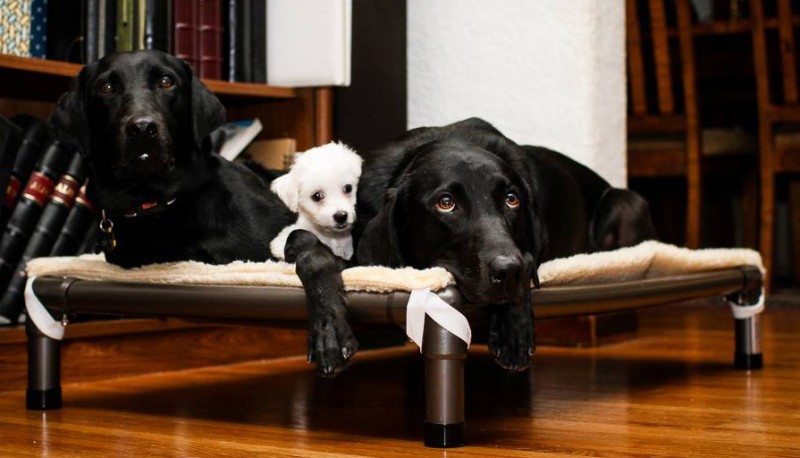Introducing Your Dog to a New Baby
Posted by Jenn on 09/15/2016
Bringing home a new baby is one of life’s most joyful experiences, but for a canine member of the family, it can be really confusing. The house is suddenly full of new sounds and smells, and the dog is no longer the center of human attention.
Luckily, most dogs adjust just fine to having a squirmy mini-human around. Here are a few ideas for a smooth and safe transition for the whole family.
Before Baby’s Arrival
- Once you know you are expecting, work on perfecting your dog’s obedience skills. For example, your dog will need to know the difference between her toys and baby toys, so a reliable “Leave It” or “Drop It” will be essential. If your dog is already struggling with separation anxiety or some other behavior issue, you may want to consult a vet or a qualified animal behaviorist for help. These issues will only become harder to manage later on.
- Think about how your dog’s habits would impact a new baby. Maybe you don’t mind your dog jumping on the couch now, but what if you were trying to feed an infant on that couch? Michael Wombacher, author of the book Good Dog, Happy Baby, says, “The first—and main—thing you want to think about is all the things you won’t be allowing your dog to do once your baby arrives. Once you’re clear on those, eliminate them right away.”
- Do a little role-playing to let your dog practice being around a “baby.” For example, you can push a doll in a stroller, or walk around the house with a doll in a baby carrier. Watch how your dog responds, and reward her for being calm.
- Once your dog seems to be doing well with the “baby,” invite friends with children over for a well-supervised introduction.
- Set up nursery furniture and equipment ahead of time, so your dog can smell it and get used to it. If any of the gizmos swing, flash, or make noise, turn them on in your dog’s presence. You can even try playing recordings of babies crying.
- If your dog loves smelly things from the bathroom trash, set up a secure place for diapers. Trash cans with locking lids usually work well.
- Consider getting some baby gates. Newborn babies obviously won’t need them yet, but gates can be useful for keeping dogs in (or out of) particular areas of the house.
- Make sure your dog is up-to-date on all vaccinations and preventatives. Not only are some canine diseases harmful to children, but you probably won’t feel like trekking to the vet’s office right after Baby arrives.
- Before you bring your baby home from the hospital, have someone bring your dog a blanket with the baby’s scent on it. You can also put baby lotion on your own hands to get your dog used to the smell.
Baby’s Arrival
- When you bring your baby home, it’s likely that your dog won’t have seen you for a little while and will be excited. If possible, have someone else hold the baby as you greet your dog.
- Physical activity does wonders for a dog’s behavior, but don’t try to do everything yourself. In the first few weeks you may be too exhausted to keep up with your dog’s usual exercise routine, so consider making arrangements with a dog walker or doggie daycare.
- Your dog should have only positive associations with the new baby. Try giving your dog treats or even dinner when she’s in your baby’s presence. Isolating your dog from the family action will only make the transition harder and more confusing.
- Make sure your dog can get to her crate or another quiet “safe zone” if she’s stressed. Equip the safe zone with a favorite toy and a comfortable dog bed.

No matter how sweet your dog is or how well you have prepared, never leave your baby and your dog alone together for any length of time – especially if the baby is sleeping or on the floor! And if your dog shows any signs of discomfort or aggression around your baby (such as lunging or snapping), remove your dog from the situation immediately and get professional advice. Far too many children are bitten, and far too many dogs are surrendered or euthanized, because people did not recognize warning signs until it was too late.
